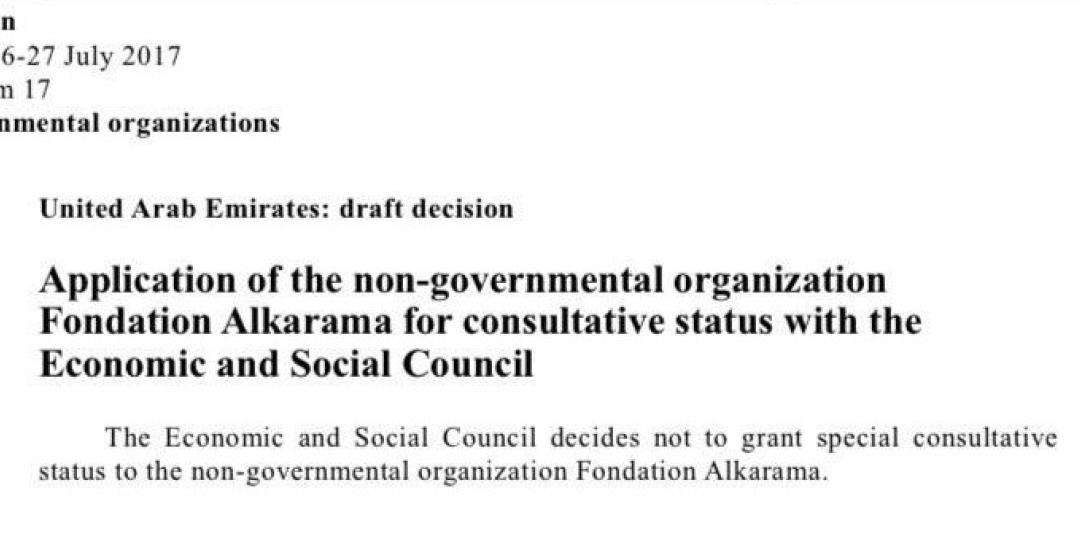
Alkarama is appalled by the decision of the Economic and Social Council not to grant us the consultative status, following a draft resolution introduced by the United Arab Emirates over “alleged ties to terrorism”. This is at odds with the positive recommendation of the Committee on Non-Governmental Organisations taken in May 2017, after a long vetting process. It also clearly constitutes yet another attempt by Arab repressive regimes to undermine and discredit our work of providing pro bono legal assistance to victims of human rights violations. Using the label of terrorism has unfortunately become the Arab countries’ weapon of choice to stifle criticism. We deeply regret that some Western liberal democracies did not oppose the resolution since such practices go against the values of democracy, human rights and the rule of law that they hold so dear.
It however came as no surprise that the resolution was initiated by the UAE, a country known for its history of methodically silencing dissenting voices. In the UAE, human rights defenders and other peaceful dissenting voices are targeted with systematic reprisals: “terrorism”, “spreading false information” or “tarnishing the image of the State” are only a few of the charges used to prosecute and imprison them. In the same vein, it is only natural that Alkarama faces such resentment from Arab States for having chosen international law and the United Nations system as tools to defend victims of gross human rights abuses. It is not the first time – and probably not the last – that we are subjected to reprisals as repressive regimes consider peaceful human rights advocacy as highly subversive and threatening their security.
Nevertheless, this will only embolden us to continue to speak out for all those who are silenced. Since 2004, Alkarama has submitted complaints to the United Nations on behalf of thousands of victims of torture, enforced disappearance, arbitrary detention and summary execution throughout the Arab world without any discrimination. Conscious of the fragility of human rights protection in the current international context, our commitment to defend them remains unshaken. By attempting to silence us, these States are trying to shut down a trusted channel between individuals from the region and the human rights mechanisms set up by the United Nations to protect those rights universally. This is not only an attack against Alkarama, it is an attack against the right of all women and men from the region to claim the rights they inherently hold.
We have always carried out our mission with the utmost transparency. It is in this same spirit that we wish to clarify the deplorable arguments raised by the UAE, supported by States like Algeria, to deny us the ECOSOC status over our “alleged ties to terrorism”.
First, the UAE argued that they had designated us “as terrorist organisation”. This refers to a list published by the Emirates News Agency in November 2014, of 83 designated terrorist organisations in implementation of Federal Law No. 7 of 2014, among which the “Alkarama organisation”. Not only have we never received any notification of such a designation, but when we sought clarification by writing to the UAE Permanent Mission in Geneva, we never received a response. Considering the lack of credibility of such listing – which included well-known charities such as the Council on American Islamic Relations, Islamic Relief UK and the Muslim Association of Britain – we remain unconcerned.
Secondly, the UAE argued that “the Al-Qaida Sanctions Committee had designated its founder as a financier and facilitator of terrorism”. This refers to one of our founders, Dr Adulrahman Al Nuaimi, a university professor and former Amnesty International prisoner of conscience, who was designated by the UN Security Council following his listing by the US Department of Treasury in December 2013. The US Treasury has never submitted any evidence of its allegations; Dr Al Nuaimi denied all charges and officially notified the American authorities of his willingness to appear before a court of law. More than three years later, he has never received a response to his affidavit. In addition, in a spirit of transparency, Alkarama contacted the US Treasury Department, which officially confirmed in a letter that “Alkarama has never been sanctioned” but that Dr Nuaimi’s designation concerned him in his private capacity. Ever since this listing, Arab governments and some politically motivated press articles have repeatedly spread rumours about Alkarama being “linked to Al Qaeda” in an attempt to discredit our work.
Thirdly, Algeria, a co-sponsor of the resolution, affirmed that “members of Fondation Alkarama were being prosecuted in court”. Indeed, our Executive Director Mourad Dhina and Legal Director Rachid Mesli were both prosecuted for “terrorism” by the Algerian authorities, the former because he had openly called for democratic change in his country, the latter because of his work as a human rights lawyer. In 2012, Dr Dhina was arrested in Paris on the basis of an international arrest warrant issued by Algeria; the French judge concluded that the accusations were “grotesque” and ordered his release. Similarly, in 2015, Mr Mesli was placed under house arrest in Italy pending an extradition request by Algeria. However, the Court quickly lifted the measure concluding that evidence it received portrayed him as having “a range of activities aimed at the protection of human rights, hardly compatible with an accusation of terrorism”.
This targeting of Alkarama is just one more example of how peaceful human rights activism is under the constant threat of misused counterterrorism policies to curb fundamental rights and freedoms. Yet, it constitutes one more reason for us to continue, with greater conviction and commitment, to strive for an Arab world where people live in freedom and dignity protected by the rule of law.
For more information or an interview, please contact media@alkarama.org (Dir: +41 22 734 1008).
